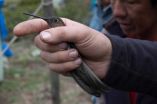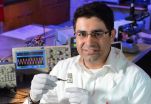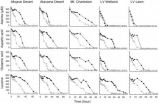(Press-News.org) Scientific uncertainty has been described as a 'monster' that prevents understanding and delays mitigative action in response to climate change. New research by Professor Stephan Lewandowsky of the University of Bristol, and international colleagues, shows that uncertainty should make us more rather than less concerned about climate change.
In two companion papers, published today in Climatic Change, the researchers investigated the mathematics of uncertainty in the climate system and showed that increased scientific uncertainty necessitates even greater action to mitigate climate change.
The scientists used an ordinal approach – a range of mathematical methods that address the question: 'What would the consequences be if uncertainty is even greater than we think it is?'
They show that as uncertainty in the temperature increase expected with a doubling of CO2 from pre-industrial levels rises, so do the economic damages of increased climate change. Greater uncertainty also increases the likelihood of exceeding 'safe' temperature limits and the probability of failing to reach mitigation targets. The authors highlight this with the case of future sea level, as larger uncertainty in sea level rise requires greater precautionary action to manage flood risk.
Professor Stephan Lewandowsky, Chair in Cognitive Psychology and member of the Cabot Institute at the University of Bristol, said: "We can understand the implications of uncertainty, and in the case of the climate system, it is very clear that greater uncertainty will make things even worse. This means that we can never say that there is too much uncertainty for us to act. If you appeal to uncertainty to make a policy decision the legitimate conclusion is to increase the urgency of mitigation."
Co-author, Dr James Risbey of Australia's CSIRO Marine and Atmospheric Research, said: "Some point to uncertainty as a way to minimize the climate change problem, when in fact it means that the problem is more likely to be worse than expected in the absence of that uncertainty. This result is robust to a range of assumptions and shows that uncertainty does not excuse inaction."
These new findings challenge the frequent public misinterpretation of uncertainty as a reason to delay action. Arguing against mitigation by appealing to uncertainty is therefore misplaced: any appeal to uncertainty should provoke a greater, rather than weaker, concern about climate change than in the absence of uncertainty.
INFORMATION:
The research team included scientists from the University of Bristol, University of Western Australia, CSIRO Marine and Atmospheric Research, Australian National University, University of New South Wales and the Antarctic Climate and Ecosystems Cooperative Research Centre.
The research was funded by a number of research bodies, including the Australian Research Council, the Australian Research Council Centre of Excellence in Climate Systems Science and the Royal Society.
Papers
'Scientific Uncertainty and Climate Change: Part I. Uncertainty and Unabated Emissions' by Stephan Lewandowsky, James S Risbey, Michael Smithson, Ben R Newell and John Hunter in Climatic Change
'Scientific Uncertainty and Climate Change: Part II. Uncertainty and Mitigation' by Stephan Lewandowsky, James S Risbey, Michael Smithson and Ben R Newell in Climatic Change
The Cabot Institute
The Cabot Institute carries out fundamental and responsive research on risks and uncertainties in a changing environment. It drives new research in the interconnected areas of climate change, natural hazards, water and food security, low carbon energy, and future cities. Its research fuses rigorous statistical and numerical modelling with a deep understanding of social, environmental and engineered systems – past, present and future. It seeks to engage wider society by listening to, exploring with, and challenging its stakeholders to develop a shared response to 21st Century challenges. Find out more about at http://www.bristol.ac.uk/cabot
Scientists unmask the climate uncertainty monster
2014-04-04
ELSE PRESS RELEASES FROM THIS DATE:
Key genetic mutations could be new hope for adrenocortical tumor patients
2014-04-04
April 3, 2014, Shenzhen, China - Chinese researchers from Rui-Jin Hospital, Shanghai Jiao-Tong University School of Medicine, BGI, and other institutions have discovered that the activating hotspot L205R mutation in PRKACA gene was closely associated with adrenocortical tumors (ACTs), and the relationship of recurrently mutated DOT1L and CLASP2 with ACTs' other subtypes. The latest study published online in Science opens a new insight into diagnosis and treatment of Adrenal Cushing's syndrome.
Adrenal Cushing's syndrome results from autonomous production of cortisol ...
An ultrathin collagen matrix biomaterial tool for 3-D microtissue engineering
2014-04-04
A novel ultrathin collagen matrix assembly allows for the unprecedented maintenance of liver cell morphology and function in a microscale "organ-on-a-chip" device that is one example of 3D microtissue engineering.
A team of researchers from the Center for Engineering in Medicine at the Massachusetts General Hospital have demonstrated a new nanoscale matrix biomaterial assembly that can maintain liver cell morphology and function in microfluidic devices for longer times than has been previously been reported in microfluidic devices. This technology allows researchers to ...
Hummingbird evolution soared after they invaded South America 22 million years ago
2014-04-04
A newly constructed family tree of the hummingbirds, published today in the journal Current Biology, tells a story of a unique group of birds that originated in Europe, passed through Asia and North America, and ultimately found its Garden of Eden in South America 22 million years ago.
These early hummingbirds spread rapidly across the South American continent, evolved iridescent colors – various groups are known today as brilliants, topazes, emeralds and gems – diversified into more than 140 new species in the rising Andes, jumped water gaps to invade North America and ...
Iowa State scientist developing materials, electronics that dissolve when triggered
2014-04-04
AMES, Iowa – A medical device, once its job is done, could harmlessly melt away inside a person's body. Or, a military device could collect and send its data and then dissolve away, leaving no trace of an intelligence mission. Or, an environmental sensor could collect climate information, then wash away in the rain.
It's a new way of looking at electronics: "You don't expect your cell phone to dissolve someday, right?" said Reza Montazami, an Iowa State University assistant professor of mechanical engineering. "The resistors, capacitors and electronics, you don't expect ...
Watching for a black hole to gobble up a gas cloud
2014-04-04
Right now a doomed gas cloud is edging ever closer to the supermassive black hole at the center of our Milky Way galaxy. These black holes feed on gas and dust all the time, but astronomers rarely get to see mealtime in action.
Northwestern University's Daryl Haggard has been closely watching the little cloud, called G2, and the black hole, called Sgr A*, as part of a study that should eventually help solve one of the outstanding questions surrounding black holes: How exactly do they achieve such supermassive proportions?
She will discuss her latest data at a press ...
Bacteria get new badge as planet's detoxifier
2014-04-04
Las Vegas - A study published recently in PLOS ONE authored by Dr. Henry Sun and his postdoctoral student Dr. Gaosen Zhang of Nevada based research institute DRI provides new evidence that Earth bacteria can do something that is quite unusual. Despite the fact that these bacteria are made of left-handed (L) amino acids, they are able to grow on right-handed (D) amino acids. This DRI study, funded by the NASA Astrobiology Institute and the NASA Exobiology Program, takes a closer look at what these implications mean for studying organisms on Earth and beyond.
"This finding ...
Knowledge, use of IUDs increases when women are offered counseling and 'same-day' service
2014-04-04
PITTSBURGH, April 3, 2014 – Health care clinics should routinely offer same-day placement of intrauterine devices (IUDs) to women seeking emergency contraception, according to researchers at the University of Pittsburgh School of Medicine. The study findings, published online in the journal Contraception, demonstrate that providing patient education along with same-day placement service increases both knowledge and use of IUDs three months and a year after women seek emergency contraception.
"Women seeking emergency contraception, who are at very high risk of undesired ...
Researchers empower parents to inspire first-generation college-goers
2014-04-04
(PHILADEPHIA) – Parents who have not attended college are at a disadvantage when it comes to talking about higher education with their kids – yet these are the students who most need a parent's guidance.
A new approach developed and tested by researchers at University of the Pacific's Gladys L. Benerd School of Education may help solve the problem. It was presented today at the annual meeting of the American Educational Research Association. [April 4, 8:15 a.m. EDT, Philadelphia Convention Center Terrace Level, Terrace IV]
"There is a common perception that low-income ...
The Trayvon Martin case: Lessons for education researchers
2014-04-04
CHESTNUT HILL, MA (April 4, 2014) – The 2012 fatal shooting of black teenager Trayvon Martin by his Florida neighbor George Zimmerman sparked a fierce debate about racism and gun violence. Now, researchers are exploring what the controversial case says as well about sexism and violence against women.
Boston College Lynch School of Education Professor Ana M. Martinez Aleman spoke today at the American Educational Research Association annual conference in Philadelphia about the highly politicized debate surrounding the Martin case and the implications for researchers who ...
New risk factors for avalanche trigger revealed
2014-04-04
The amount of snow needed to trigger an avalanche in the Himalayans can be up to four times smaller than in the Alps, according to a new model from a materials scientist at Queen Mary University of London.
The proposed universal model could have implications in better understanding strategies for mitigating natural hazards related to snow and rock avalanches and safeguarding people on mountain villages, roads and ski resorts.
By using a branch of mechanics that aims to understand how cracks spread in solid structures, Professor Nicola Pugno from Queen Mary's School ...




